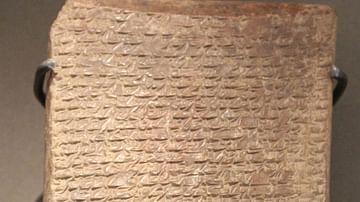Search
Search Results

Definition
René Descartes
René Descartes (1596-1650) was a French mathematician, natural scientist, and philosopher, best known by the phrase 'Cogito ergo sum' ('I think therefore I am'). He published works on optics, coordinate geometry, physiology, and cosmology...

Definition
Euclid
Euclid of Alexandria (lived c. 300 BCE) systematized ancient Greek and Near Eastern mathematics and geometry. He wrote The Elements, the most widely used mathematics and geometry textbook in history. Older books sometimes confuse him with...

Definition
Gottfried Wilhelm Leibniz
Gottfried Wilhelm Leibniz (1646-1716) was a German polymath who became well-known across Europe for his work, particularly in the fields of science, mathematics, and philosophy. Leibniz's rationalist philosophy attempted to reconcile traditional...

Article
Mesopotamian Inventions - Creating the Future
Mesopotamian inventions include many items taken for granted today, most of which were created during the Early Dynastic period (circa 2900-2350/2334 BCE) or developed from achievements of the Uruk period (circa 4000-3100 BCE). The Sumerians...

Definition
Pazuzu
Pazuzu is an Assyrian/Babylonian demonic god who was most popular in the first millenium BCE. He was the son of Hanbi (also Hanba), king of the demons of the underworld, and brother to Humbaba, the demon-god protector of the Cedar Forest...

Definition
Kingdom of Israel
The Kingdom of Israel occupied that part of the land on the Mediterranean Sea known as the Levant which corresponds roughly to the State of Israel of modern times. The region was known, historically, as part of Canaan, as Phoenicia, as Palestine...

Article
Ludlul-Bel-Nemeqi
The Ludlul-Bel-Nemeqi (c. 1700 BCE) is a Sumerian and later Babylonian poem on the theme of unjust suffering, which is thought to have influenced the biblical Book of Job. Also known as The Poem of the Righteous Sufferer, the title translates...

Definition
Aristarchus of Samos
Aristarchus of Samos (l. c. 310 - c. 230 BCE) was a Greek astronomer who first proposed a heliocentric model of the universe in which the sun, not the earth, was at the center. Although his theory was noted by other thinkers of his time...

Article
Fatima Al-Fihri and Al-Qarawiyyin University
Fatima Al-Fihri (c. 800-880) was a Muslim woman, scholar and philanthropist who is credited with founding the world’s oldest, continuously running university during the 9th century: the University of Al-Qarawiyyin, located in Fez in Morocco...

Definition
Gilgamesh
Gilgamesh is the semi-mythic King of Uruk best known as the hero of The Epic of Gilgamesh (c. 2150-1400 BCE) the great Babylonian poem that predates Homer's Iliad and Odyssey by 1500 years and, therefore, stands as the oldest piece of epic...